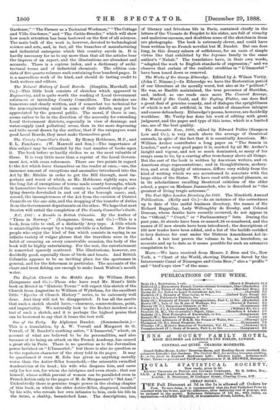One of the Forty. By Alphonse Daudet. (Sonnenschein.)— This is
a translation, by A. W. Verrall and Margaret de G. Verrall, of M. Daudet's seething satire, " L'Immortel," which, on account of what are believed to be its personalities, and also because of its being an attack on the French Academy, has caused a great stir in Paris. There is no question as to the Juvenalian power lavished on " L'Immortel ;" but there is also no question as to the repulsive character of the story told in its pages. It may be questioned if even M. Zola has given us anything morally worse than the Astier-Rehu household,—the miserable swindled Academician at its head ; his wife who despises him, and cares only for her son, for whom she intrigues and even steals ; that son himself, whose selfish pursuit of women can be paralleled even in French fiction only in the pages of M. de Maupassant's "Bel Ami." Undoubtedly there is genuine tragic power in the closing chapter of this book, in which the elder Astier-Rehu, disgraced, insulted by his wife, who reveals her own infamies to him, ends his life in the Seine, a shabby, besmirched Lear. The descriptions, too, of literary and frivolous life in Paris, contained chiefly in the letters of the Vicomte de Freydet to his sister, are full of vivacity and malicious sarcasm, and doubtless some of the sketches in them are photographs. The book is extremely clever, and could have been written by no French novelist but M. Daudet. But one does long, in this dreary Behar& of selfishness, for an oasis of simple virtue like that exhibited by the Joyeuse family in the same author's " Nabab." The translators have, in their own words, "adapted the work to English standards of expression i" and we observe that certain of the realistic crudities in " L'Immortel " have been toned down or removed.


































 Previous page
Previous page